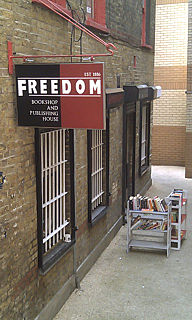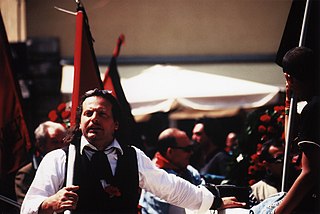Related Research Articles
Anarcho-communism, also known as anarchist communism, is a political philosophy and anarchist school of thought which advocates the abolition of the state, capitalism, wage labour, social hierarchies and private property in favor of common ownership of the means of production and direct democracy as well as a horizontal network of workers' councils with production and consumption based on the guiding principle "From each according to his ability, to each according to his needs". Some forms of anarcho-communism such as insurrectionary anarchism are strongly influenced by egoism and radical individualism, believing anarcho-communism to be the best social system for the realization of individual freedom. Most anarcho-communists view anarcho-communism as a way of reconciling the opposition between the individual and society.
Libertarian socialism, also referred to as anarcho-socialism, anarchist socialism, free socialism, stateless socialism, socialist anarchism and socialist libertarianism, is an anti-authoritarian, anti-statist and libertarian political philosophy within the socialist movement which rejects the state socialist conception of socialism as a statist form where the state retains centralized control of the economy. Overlapping with anarchism and libertarianism, libertarian socialists criticize wage slavery relationships within the workplace, emphasizing workers' self-management and decentralized structures of political organization. As a broad socialist tradition and movement, libertarian socialism includes anarchist, Marxist and anarchist or Marxist-inspired thought as well as other left-libertarian tendencies. Anarchism and libertarian Marxism are the main currents of libertarian socialism.

Freedom Press is an anarchist publishing house in Whitechapel, London, United Kingdom. Founded in 1886, it is the largest anarchist publishing house in the country and the oldest of its kind in the English speaking world. It is based at 84b Whitechapel High Street in the East End of London.

Free-market anarchism, or market anarchism, also known as free-market anti-capitalism and free-market socialism, is the branch of anarchism that advocates a free-market economic system based on voluntary interactions without the involvement of the state. A form of individualist anarchism, left-libertarianism libertarian socialism and market socialism, it is based on the economic theories of mutualism and individualist anarchism in the United States. Left-wing market anarchism is a modern branch of free-market anarchism that is based on a revival of such free-market anarchist theories. It is associated with left-libertarians such as Kevin Carson and Gary Chartier, who consider themselves anti-capitalists and socialists.

The Zabalaza Anarchist Communist Front, formerly known as the Zabalaza Anarchist Communist Federation (ZabFed), is a platformist–especifista anarchist political organisation in South Africa, based primarily in Johannesburg. The word zabalaza means "struggle" in isiZulu and isiXhosa. Initially, as ZabFed, it was a federation of pre-existing collectives, mainly in Soweto and Johannesburg. It is now a unitary organisation based on individual applications for membership, describing itself as a "federation of individuals". Historically the majority of members have been people of colour. Initially the ZACF had sections in both South Africa and Swaziland. The two sections were split in 2007, but the Swazi group faltered in 2008. Currently the ZACF also recruits in Zimbabwe. Members have historically faced repression in both Swaziland and South Africa.
Anarchism without adjectives, in the words of historian George Richard Esenwein, "referred to an unhyphenated form of anarchism, that is, a doctrine without any qualifying labels such as communist, collectivist, mutualist, or individualist. For others, [...] [it] was simply understood as an attitude that tolerated the coexistence of different anarchist schools".
Anarchism in the United States began in the mid-19th century and started to grow in influence as it entered the American labor movements, growing an anarcho-communist current as well as gaining notoriety for violent propaganda of the deed and campaigning for diverse social reforms in the early 20th century. By around the start of the 20th century, the heyday of individualist anarchism had passed and anarcho-communism and other social anarchist currents emerged as the dominant anarchist tendency.
Left-libertarianism, also known as egalitarian libertarianism, left-wing libertarianism or social libertarianism, is a political philosophy and type of libertarianism that stresses both individual freedom and social equality. Left-libertarianism represents several related yet distinct approaches to political and social theory. In its classical usage, it refers to anti-authoritarian varieties of left-wing politics such as anarchism, especially social anarchism, whose adherents simply call it libertarianism. In the United States, it represents the left-wing of the libertarian movement and the political positions associated with academic philosophers Hillel Steiner, Philippe Van Parijs and Peter Vallentyne that combine self-ownership with an egalitarian approach to natural resources. This is done to distinguish libertarian views on the nature of property and capital, usually along left–right or socialist–capitalist lines.
Libertarianism is a political philosophy and movement that upholds liberty as a core principle. Libertarians seek to maximize autonomy and political freedom, emphasizing free association, freedom of choice, individualism and voluntary association. Libertarians share a skepticism of authority and state power, but some of them diverge on the scope of their opposition to existing economic and political systems. Various schools of libertarian thought offer a range of views regarding the legitimate functions of state and private power, often calling for the restriction or dissolution of coercive social institutions. Different categorizations have been used to distinguish various forms of libertarianism. Scholars distinguish libertarian views on the nature of property and capital, usually along left–right or socialist–capitalist lines.
Libertarianism in the United States is a political philosophy and movement promoting individual liberty. According to common meanings of conservatism and liberalism in the United States, libertarianism has been described as conservative on economic issues and liberal on personal freedom, often associated with a foreign policy of non-interventionism. Broadly, there are four principal traditions within libertarianism, namely the libertarianism that developed in the mid-20th century out of the revival tradition of classical liberalism in the United States after liberalism associated to the New Deal; the libertarianism developed in the 1950s by anarcho-capitalist author Murray Rothbard, who based it on the anti-New Deal Old Right and 19th-century libertarianism and American individualist anarchists such as Benjamin Tucker and Lysander Spooner while rejecting the labor theory of value in favor of Austrian School economics and the subjective theory of value; the libertarianism developed in the 1970s by Robert Nozick and founded in American and European classical liberal traditions; and the libertarianism associated to the Libertarian Party which was founded in 1971, including politicians such as David Nolan and Ron Paul.

Libertarian Marxism is a broad scope of economic and political philosophies that emphasize the anti-authoritarian and libertarian aspects of Marxism. Early currents of libertarian Marxism such as left communism emerged in opposition to Marxism–Leninism.

Anarchism in France can trace its roots to thinker Pierre-Joseph Proudhon, who grew up during the Restoration and was the first self-described anarchist. French anarchists fought in the Spanish Civil War as volunteers in the International Brigades. According to journalist Brian Doherty, "The number of people who subscribed to the anarchist movement's many publications was in the tens of thousands in France alone."
Anarchism as a social movement in Cuba held great influence with the working classes during the 19th and early 20th century. The movement was particularly strong following the abolition of slavery in 1886, until it was repressed first in 1925 by President Gerardo Machado, and more thoroughly by Fidel Castro's Marxist–Leninist government following the Cuban Revolution in the late 1950s. Cuban anarchism mainly took the form of anarcho-collectivism based on the works of Mikhail Bakunin and, later, anarcho-syndicalism. The Latin American labor movement, and by extension the Cuban labor movement, was at first more influenced by anarchism than Marxism.
Leaving aside the related tradition of syndicalism in Ireland, associated with figures like James Connolly, Irish anarchism had little historical tradition before the 1970s. As a movement it only really developed from the late 1990s – although one organisation, the Workers Solidarity Movement has had a continuous existence since 1984. Anarchists have been active in Ireland as far back as 1886, but these were short-lived groups or isolated individuals with large gaps between activity.
The Vanguard Group was an anarchist political group active during the 1930s, which published the periodical Vanguard: Journal of Libertarian Communism, led by Sam Dolgoff.
The following outline is provided as an overview of and topical guide to anarchism, generally defined as the political philosophy which holds the state to be undesirable, unnecessary and harmful, or alternatively as opposing authority and hierarchical organization in the conduct of human relations. Proponents of anarchism, known as anarchists, advocate stateless societies or non-hierarchical voluntary associations.
Social anarchism is the branch of anarchism that sees individual freedom as interrelated with mutual aid. Social anarchist thought emphasizes community and social equality as complementary to autonomy and personal freedom. It attempts to accomplish this balance through freedom of speech, which is maintained in a decentralized federalism, with freedom of interaction in thought and subsidiarity. Subsidiarity is best defined as "that one should not withdraw from individuals and commit to the community what they can accomplish by their own enterprise and industry" and that "[f]or every social activity ought of its very nature to furnish help to the members of the body social, and never destroy and absorb them", or the slogan "Do not take tools out of people's hands".

Platformism is a form of anarchist organization that seeks unity from its participants, having as a defining characteristic the idea that each platformist organization should include only people that are fully in agreement with core group ideas, rejecting people who disagree. It stresses the need for tightly organized anarchist organizations that are able to influence working class and peasant movements.
Anarchism in Belgium began to spread after the fall of the Paris Commune, when many Communards, including Élisée Reclus, took refuge in Brussels. At the time, the Belgian César de Paepe defended a mutualism inspired by Pierre-Joseph Proudhon, which proposed to organize production and distribution by relying on independent workers' associations without the intermediary of the State.